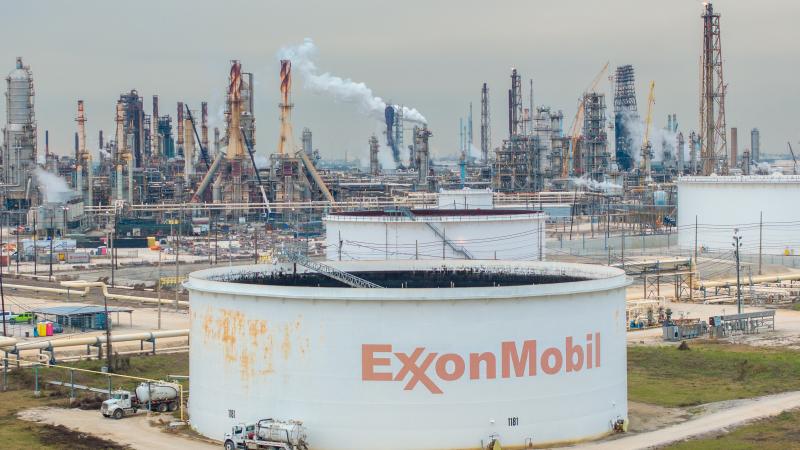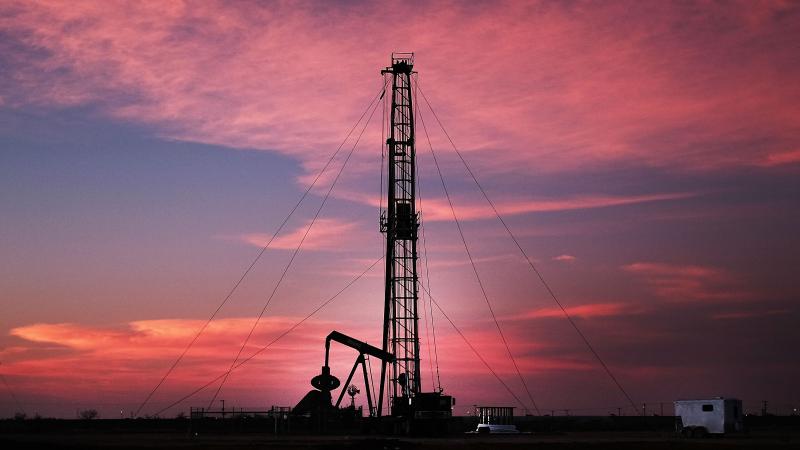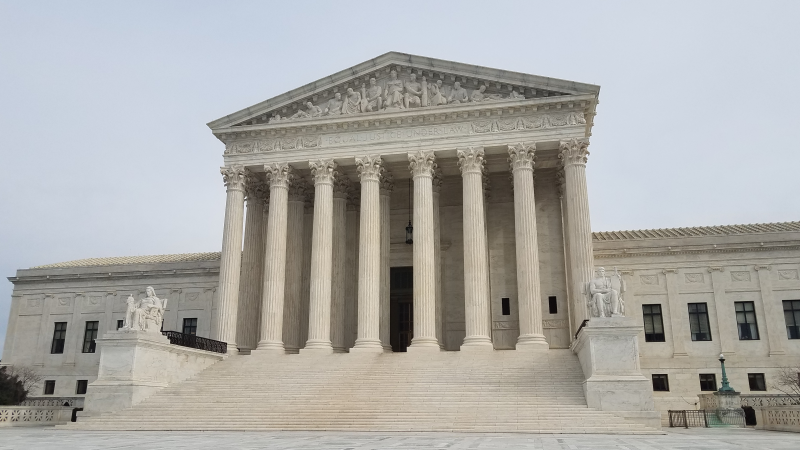Research widely cited to support pausing LNG exports riddled with errors, analysis says
This isn’t first time that Cornell Professor Robert Howarth has been criticized for his research. His history of being an outspoken advocate for the rapid elimination of fossil fuels has led to industry accusations that his research is biased.
At the beginning of this year, the Biden administration enacted a pause on liquified natural gas (LNG) permits. The policy created regulatory uncertainty in the industry, impacting jobs and billion-dollar investments.
The announcement of the policy followed a coordinated effort by activists at nonprofits and in academia, as well as dozens of Democratic members of congress, to hasten an energy transition away from fossil fuels by blocking exports of America’s abundant natural gas resources to countries abroad.
These groups cited research by Cornell University climate scientist Robert Howarth, who openly advocates for the rapid elimination of fossil fuels. The research has been updated several times since it was first distributed as a preprint, which is a study circulated publicly prior to peer-review, but it originally claimed that LNG was 274% worse for the climate than coal.
Howarth’s past research on the emissions of natural gas has been widely panned by other researchers. Now, Jonah Messigner, a senior energy analyst at the Breakthrough Institute, has performed an analysis of Howarth’s findings and found several errors with Howarth’s work.
The Breakthrough Institute, describes itself as “a global research center that identifies and promotes technological solutions to environmental and human development challenges.” It advocates for ecomodernism and addressing climate change.
The LNG permitting pause is not the first time that questionable research by anti-fossil fuel activists was used to support policies meant to stop consumers from using natural gas.
“Sound research should inform sound policy, but far too often, we’re seeing shoddy research influence predetermined and partisan policy objectives. Robert Howarth and his LNG work are a clear example of this. From fracking to gas stoves to LNG attacks and more, the anti-energy onslaught is not being fueled by genuine science, but biased researchers wearing the hat of academics, all bought and paid for by politically motivated, billionaire donors," Jeffrey Eshelman, president and CEO of the Independent Petroleum Association of America, told Just the News.
Research to policy
About a month before President Joe Biden announced the pause, over a hundred academics penned a letter to the president, claiming that the science is “overwhelmingly clear” that “must stop expanding fossil fuel extraction” and “rapidly transition to renewable energy.”
The letter cited no research demonstrating that it’s possible to rapidly eliminate over 80% of the world’s energy and replace it with a theoretical global energy system powered by highly expensive energy sources, which never been demonstrated to work on a small scale, much less a global one.
The letter argued that LNG facilities are “inherently leaky operations” that were producing “spiraling emissions of the climate super-pollutant methane,” which has many times the warming potential than carbon dioxide.
To support this policy request, the letter cited Howarth’s study, who was also one of the letter’s signatories. Joining the chorus calling for restrictions on LNG exports was a letter from dozens of members of Congress, which also cited Howarth’s research.
As Messinger with the Breakthrough Institute explains in his analysis, Howarth’s study performs a life cycle assessment (LCA) of greenhouse gas intensity of U.S. LNG for overseas power production. It tallies all the greenhouse gases (GHG) emitted throughout the supply chain to calculate the total amount of GHGs emitted per unit of LNG.
Howarth argues that other research estimates use outdated EPA methane leakage rates and don’t take into account more recent data, and Messinger said, with some exceptions, Howarth is right on this point. Most of the errors are with Howarth’s calculations on methane leakage rates with other areas of the LNG supply chain.
According to Messinger, Howarth included leakage rates from oil and gas production together, attributing all of it to natural gas. He uses without explanation high estimations of methane leakage in overseas pipeline infrastructure, overestimates shipping distances, and makes incorrect calculations of methane leakage from LNG tankers.
"Junk science"
This isn’t first time Howarth has been criticized for producing questionable research. Combined with his history of being an outspoken advocate for the rapid elimination of fossil fuels, critics have accused him of using his research to advance his political positions.
Tom Shepstone, an energy expert who publishes "Energy Security and Freedom" on Substack, pointed out that Howarth is on the board of directors of the anti-fossil fuel nonprofit Food and Water Watch.
It was a similar story when the anti-fossil fuel advocacy group Rocky Mountain Institute produced questionable research alleging a link between gas stoves. The research initiated the debate over a ban on gas stoves.
“That was junk science, too. There’s so much of that around,” Shepstone said. He said there are honest scientists out there who come to conclusions he doesn’t always agree with, but the climate field is being polluted with a lot of activists whose advocacy compromises their objectivity.
Kathleen Sgamma, president of the Western Energy Alliance, told Just the News that scientific research suffers from many problems, including the lack of replication that would further demonstrate the efficacy of findings. She said over the years, a lot more research is “just biased opinion pieces.”
“It's not subject to any real peer review. It makes claims that aren't really repeatable. They don't really have any real data or science behind them, and these things get circulated around as if they're real science. And then somebody, a Congressman or an activist group, can point their finger and say, ‘Oh, science supports this policy,’” Sgamma said.
She said that Howarth’s past research claiming to find LNG produces more emissions than coal, was likewise found to be riddled with errors, but once the research is publicized, it has staying power.
Howarth explained in an interview in Bloomberg in February that anti-fossil fuel activist Bill McKibben, who had referred to Howarth’s study in an October 2023 New Yorker piece calling for bans on LNG exports, that he should release his study as a preprint. That preprint, even though it hadn't been peer reviewed, was then repeatedly cited in calling for the LNG export restrictions McKibben and other climate activists advocate for.
Howarth makes no attempt to hide his politics in the Bloomberg article. "We need to get rid of all fossil fuels as quickly as possible. Let's just move on and get rid of the gas system,” he said.
Howarth’s response
Howarth told Just the News that he hadn’t seen Messinger’s analysis until he was contacted for comment on this article.
“My first reaction is that he is way off the mark in his criticism, and in fact mischaracterizes both what I have written and the references upon which I rely. Beyond this, his report does not seem as though it is written for a professional, scientific or engineering audience. Rather, it seems like something written to confuse a lay audience, while trying to come across as ‘scientific,’” Howarth said.
Howarth didn’t provide any details as to how Messinger was off or how he mischaracterized any part of his research. He said Messinger seems to have “no background experience in lifecycle assessments or the role of methane as a contributor to global change,” which would suggest that details on Messinger's supposed errors would be easy to provide. Howarth also pointed out that the paper isn’t peer-reviewed.
Howarth, however, didn’t dispute that he is an advocate for the rapid elimination of fossil fuels. He said “climate change is real,” which no one is disputing, but he claimed that continuing to use fossil fuels would potentially lead to “runaway feedbacks that would fundamentally change the Earth for thousands of years to come.”
“And so we must move away from fossil fuels very, very quickly,” Howarth said.
He stated that he is a member of the New York’s Climate Action Group, which is in charge of implementing the state’s climate law. “I am proud to say that I was in the majority on a 19-3 vote … that stated that New York State must very rapidly move away from natural gas, and do so on the time scale of the next decade or two,” Howarth said.
New York State Comptroller Thomas DiNapoli performed an audit of the planning and implementation of the state's Climate Act. The audit found the Public Service Commission used outdated data and wrong calculations to determine if New York could reach 70% renewable energy by 2030, the agency didn’t factor in increased energy demand from electric buildings and electrification of heating as a result of climate mandates, and it failed to properly estimate the costs to ratepayers.
Howarth noted that he’s a tenured professor of almost 40 years, has held a “prestigious endowed professorship” for over 30 years, and chaired many committees of the U.S. National Academy of Sciences. His research, he said, has more than 85,000 citations in other peer-reviewed papers.
“So critics are simply playing games with you when they say I am an advocate first and research scientist second. My record clearly proves this wrong,” Howarth said.
Opposing viewpoints
Messinger told Just the News that it is “telling” that Howarth didn’t address any of the “substantive critiques” laid out in his analysis of the Cornell professors’ research. He also said it was odd for Howarth to take issue with the analysis not being submitted for peer review, when Howarth’s paper was being circulated and cited well before it started the peer review process, in support of a national policy.
“I think that the study was premature. It did have errors. I detailed those quite clearly. And I tried to be also quite explicit about when certain errors were made, when certain errors were fixed, and which errors are still remaining,” Messinger said.
He said he also tried to communicate in his paper clearly the methodologies he used for his analysis and to make the process entirely transparent. He wrote a Python script to run his calculations, and he said he’s happy to share the code for anyone who wants to replicate his results.
Energy Secretary Jennifer Granholm said in May that the pause was expected to end next year, but the policy faced lawsuits from industry groups, Republican states, and nonprofits. A federal judge last month issued a preliminary injunction, arguing the plaintiffs were likely to succeed in their bid to overturn the rule. After a lot of pushback from Congressional Republicans and consumer groups, the ban on gas stoves also fizzled out.
Whether or not the research behind these policies was reliable, the activists’ tactics haven’t proved entirely successful so far.
The Facts Inside Our Reporter's Notebook
Links
- enacted a pause
- impacting jobs and billion-dollar investments
- research by Cornell University climate scientist Robert Howarth
- has been widely panned
- other researchers
- Breakthrough Institute
- found several errors with Howarthâs work
- ecomodernism
- penned a letter to the president,
- eliminate over 80% of the worldâs energy
- highly expensive energy sources
- never been demonstrated to work on a small scale
- dozens of members of Congress
- Energy Security and Freedom
- board of directors
- initiated the debate over a ban on gas stoves
- Western Energy Alliance
- including the lack of replication
- interview in Bloomberg
- October 2023 New Yorker
- an audit of the planning and implementation of the Climate Act
- expected to end
- issued a preliminary injunction
- ban on gas stoves also fizzled out
















